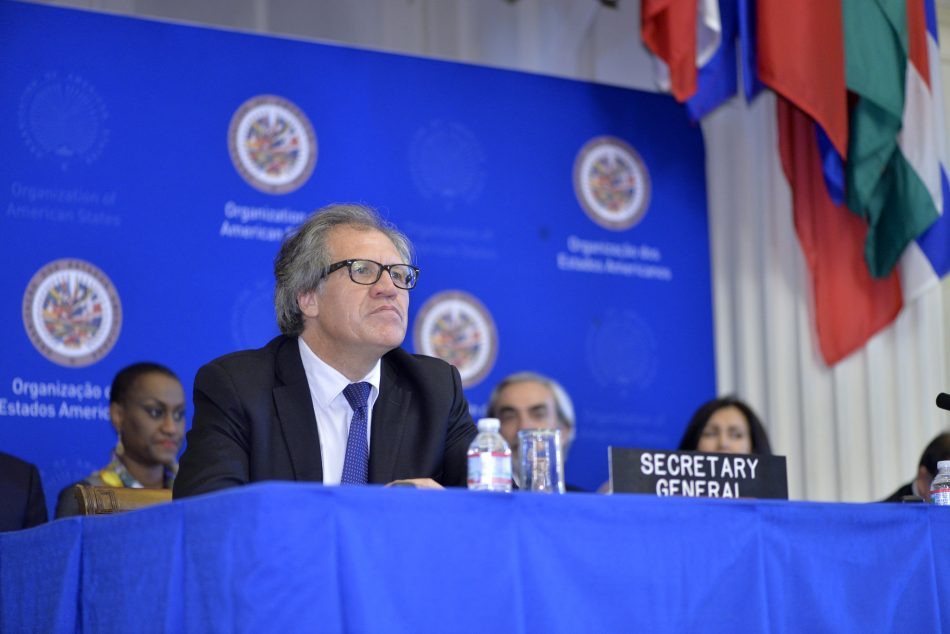
Spanish – On election night, Dante Caputo, head of the OAS mission, declared that several irregularities prevented the work of observers in 10 of the 52 voting centers. In other words, he said that 20% of the polling stations had not been observed. “We were blocked by the radar,” was the metaphor he left us.
At the same time, Secretary-General Insulza in Washington warmly congratulated Ortega for his victory. By validating an electoral fraud, he turned his back on an entire department, and snubbed a former foreign minister, himself an OAS official.
Let the reader, and the heads of states and governments of the Americas, know that the then Chief of Staff of Insulza wanted to be elected Secretary-General of the OAS today.
On December 5, 2014, the Néstor Kirchner building was inaugurated in Quito. It was the headquarters of Unasur. Those were Rafael Correa’s 15 minutes of glory, his ephemeral foreign policy success.
ALBA, Petrocaribe, Unasur, CELAC, the dense network of Castro-Chavista alliances and organizations was designed as a rival and replacement of the OAS. It was based on oil prices being at around 100 dollars, as was the case in the first decade of this century, and on a weakened and under-financed OAS, as was the case under Insulza. The alphabet soup of the new regional multilateralism, that was the Cuban strategy for the hemisphere.
Correa has always been a gushing defender of a continent without the OAS, a harsh critic of the IACHR, and a proponent of an exclusively Latin American human rights monitoring system, removed from Washington.
Let the reader, and the heads of states and governments of the Americas, know that the former Foreign Minister and Minister of Defense of Rafael Correa aspired to be elected Secretary-General of the OAS today.
Note the contrast: OAS election observation is now recognized worldwide and has the support of its Secretary-General. Unasur, on the other hand, is a defunct body, reduced to three members: Guyana, Suriname, and Nicolas Maduro’s Venezuela. Uruguay’s departure this week was the most recent withdrawal.
These are two anecdotes. They serve as an illustration of the time we have lived and as evidence that Almagro has already won.
Almagro’s OAS is reminiscent of that of Alejandro Orfila. Those of us who grew up under the long shadow of military dictatorships had the OAS as a beacon of light during that long night. For Venezuelans, Bolivians, Nicaraguans, and even Cubans, it is the same today with Almagro’s OAS.
The Inter-American Commission of that time cornered the dictators. Complaints, in loco visits, diplomatic missions, precautionary measures. The OAS saved lives. And it continues to do so today.
It also became a democratizing force overtime, once the transitions of the 1980s were defined by the human rights agenda. Insulza, Correa, Maduro, and the candidates who represent them today would have said that the OAS was “interventionist.”
Well, they do. They unearth an archaic conception of sovereignty, a discursive pretext with which they protect Maduro and become accomplices to his crimes. They cover up Evo Morales’ fraud, justify Ortega-Murillo’s uncontrolled repression, and legitimize the Castro dictatorship, to name a few.
However, Almagro won because he was grounded in the Organization’s mandate, the architecture of hemispheric multilateralism that says that the Americas is a continent of democracies. And only of democracies.
Think in terms of contracts. Article 1 of the Inter-American Democratic Charter states that “the people of the Americas have the right to democracy, and their governments have an obligation to promote and defend democracy.”
It is a treaty signed between states freely and voluntarily. It establishes an international framework comparable to any other, for example, for nuclear arms limitation, trade, or aviation. “Intervention,” therefore, is tantamount to a claim for noncompliance.
In any international regime, such as that enshrined in the Inter-American Human Rights System, the principle of reciprocity is fundamental between the parties. A portion of sovereignty is thus ceded and transferred to that supranational body. Peace and security – indispensable public goods – are derived from shared norms and achieved through mutual control.
A world of unrestricted sovereignty is the perfect alibi for despots. Almagro has already won because he has set these principles firmly carved in stone. The other candidates ignore them or silence them because of their complicity with tyrants. The member states of the Inter-American System know them; they just have to remember them when choosing an OAS Secretary-General.
Let the reader, and the heads of states and governments of the Americas, know that the only way to honor these principles is by reinstating Luis Almagro in the office on the 20th.
 Versión Español
Versión Español












